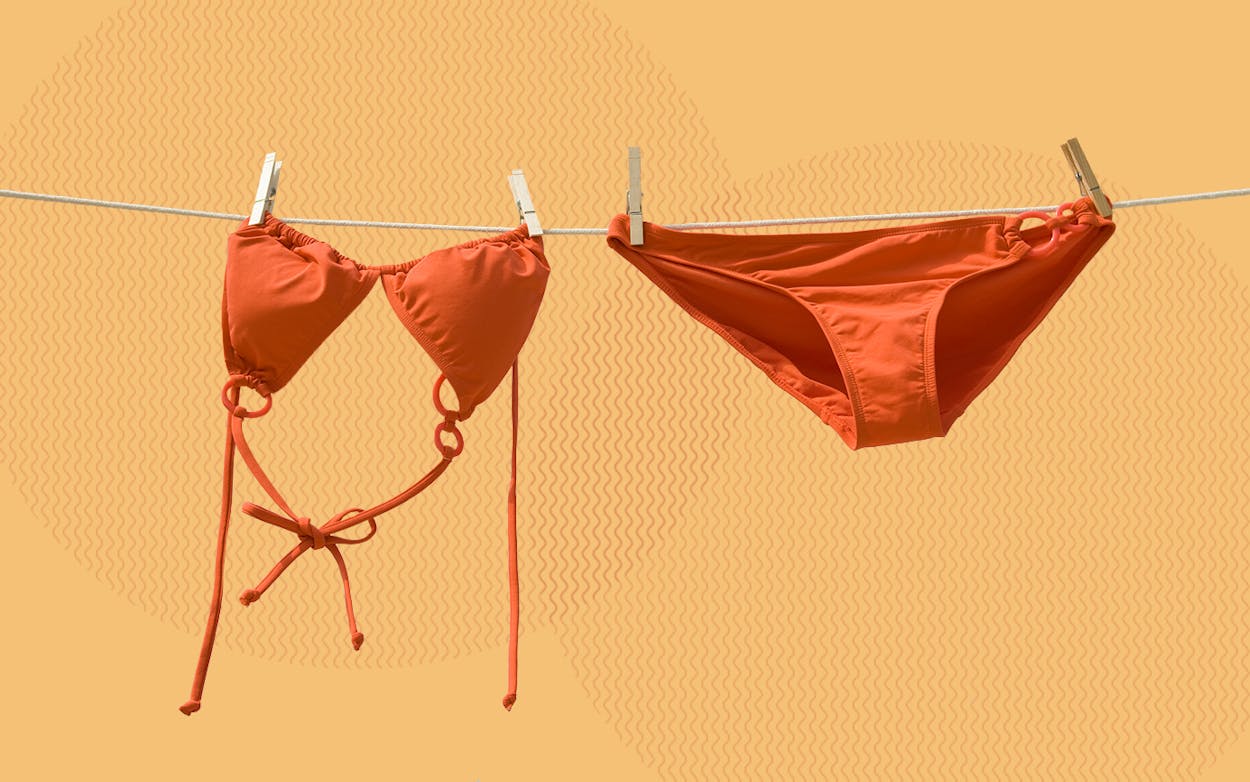The breastaurant wasn’t born in Texas, but it got here as fast as it could.
The idea of taking the basics of a sports bar—fried foods, beer, a bunch of TVs—and adding female servers in skimpy outfits originated in Florida. By the early part of this decade, though, the heart of the breastaurant business was in Texas. Chains like Twin Peaks and Ojos Locos out of Lewisville; Bone Daddy’s House of Smoke in Addison; Bombshells, owned by Houston-based strip club company Rick’s Cabaret; and Bikini’s in Austin grew to dominate the market. The tight tops and short-shorts of the Hooters girl were passé; instead, Twin Peaks and Bone Daddy’s opted for deep cleavage and tiny croptops. Bikini’s went even skimpier, as waitresses served up onion rings in swimwear and shorts. Dallas-based bar chain The Flying Saucer innovated by becoming more of a butt-staurant, with its servers in short skirts rather than revealing tops. The business model was booming.
Until it wasn’t. In 2016, Bone Daddy’s switched formats, ditching the revealing outfits for more conventional attire. Bikini’s began closing locations, down from more than a dozen around Texas and other states (along with a literal town that owner Doug Guller bought at an auction and rechristened “Bikinis, TX”) to a lone location on Austin’s Sixth Street. This week, it announced that the final outpost would be closing and reopening under a new name with servers in clothing. The Flying Saucer closed its Austin location at the end of 2017, and owner Shannon Wynne explained in a statement that “The landscape of the restaurant industry is changing rapidly across the nation.” Hooters has seen restaurants steadily close in the U.S., and its business model is shifting to include more takeout and delivery orders, where the server’s outfit isn’t part of the equation. Twin Peaks, while the strongest of the bunch from a business perspective—they have more than eighty locations across the country—now faces an existential threat in the form of a federal civil rights lawsuit around sexual harassment and Title VII.
We needn’t mourn the breastaurant. It’s a crass, exploitative, model built on encouraging some percentage of customers to sexually harass the women who worked there. Certainly, there were women among the regulars at any of the chains; there were respectful male customers; there were servers who made good money and enjoyed the work. Yet the idea that a woman’s body and attention was something that men could purchase the right to enjoy while they watched the game is inherently sexist and damaging to everyone involved. When the product is sold by a man—the founders of Bikini’s, Twin Peaks, Flying Saucer, Bone Daddy’s, Hooters, and the Arizona-based chain Tilted Kilt (which operates stores throughout Texas) are exclusively men—and the power dynamics are gendered, women aren’t being empowered just because they make good tips.
Guller, who bought the trademark on the word “breastaurant” during Bikini’s heyday and once offered to pay for an employee’s breast implants on national television, avoided specifics about why he decided to get out of the breastaurant business. But he clarified that the space where Bikini’s operates, which will be re-branded before the end of the year as BBG’s, is viable. The swimsuits aren’t.
“We continued to enjoy a really good year at that space from a profitability standpoint,” Guller said. “It’s just looking at the long-term picture. It was something that we felt needed to change. The staff was getting harder to hire. Things that are happening in the world around us, we wanted to be able to progress with where things are.” When asked if he was referring to the #MeToo movement, Guller declined to answer on the record. “Without going into detail, I would say that I think this concept [of a breastaurant] is a thing of the past,” he said.
Guller may be right. The staffing issues he touched on seem to reflect the broader cultural change. In an era when workplace sexual harassment is on people’s minds, it’s likely harder to find employees who accept, per the employee handbook, a “work environment is one in which joking and innuendo based on female sex appeal is commonplace,” as Hooters’s did in 2005, or that awards “tone scores” that involve being evaluated by “the fat on their backs, stomachs, arms and legs” and submitting photos to “corporate” before beginning shifts, as court documents allege of Twin Peaks.
The market for the breastaurant probably won’t ever dry up entirely; there will always be men who enjoy talking to scantily clad women who are paid to be nice to them. But it’s undeniable that the culture that saw breastaurants as immune to casual dining trends a few years ago has changed. It’s harder now to treat breastaurants as harmless fun. Even the guy who owns the trademark on the word finally sees that.








